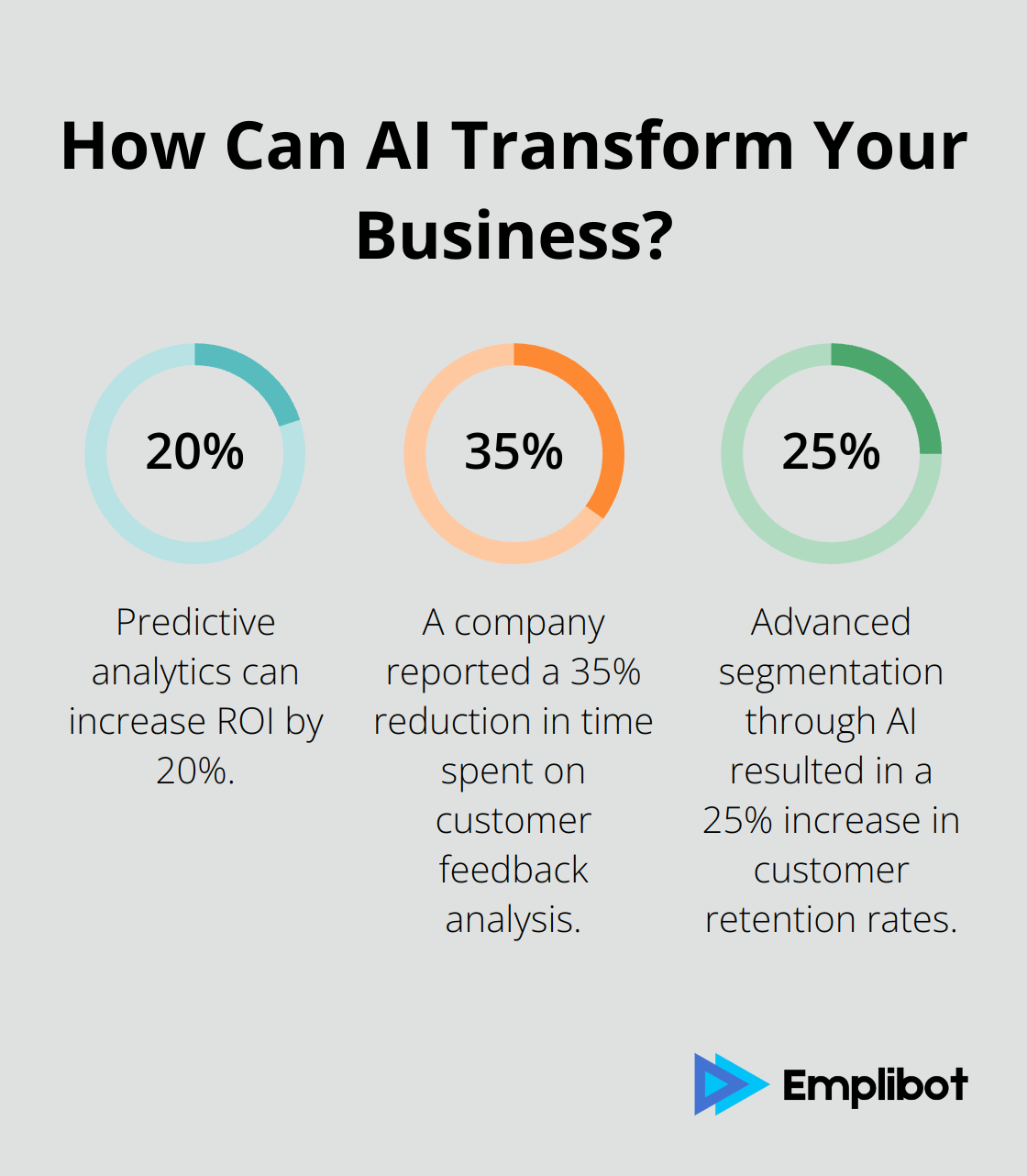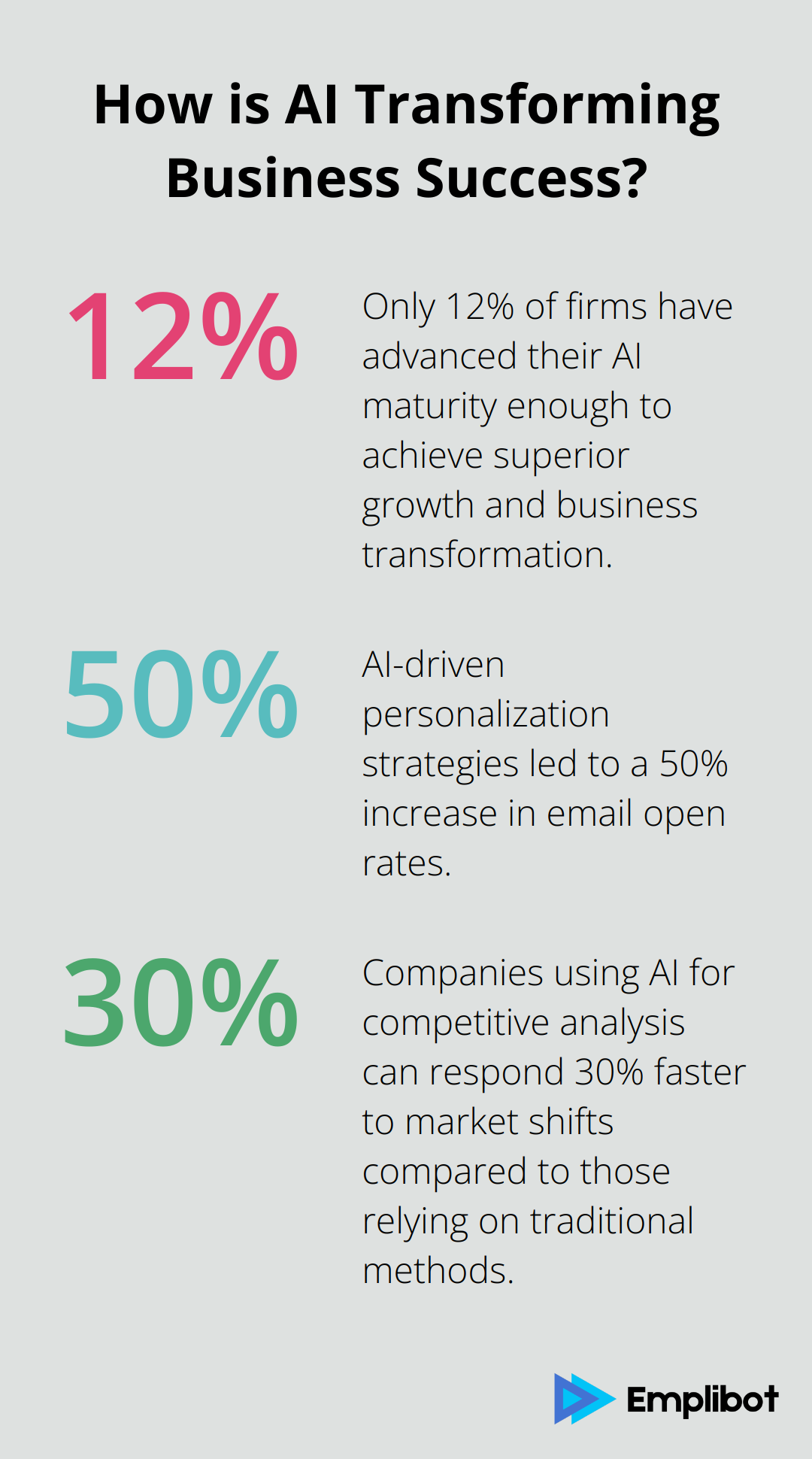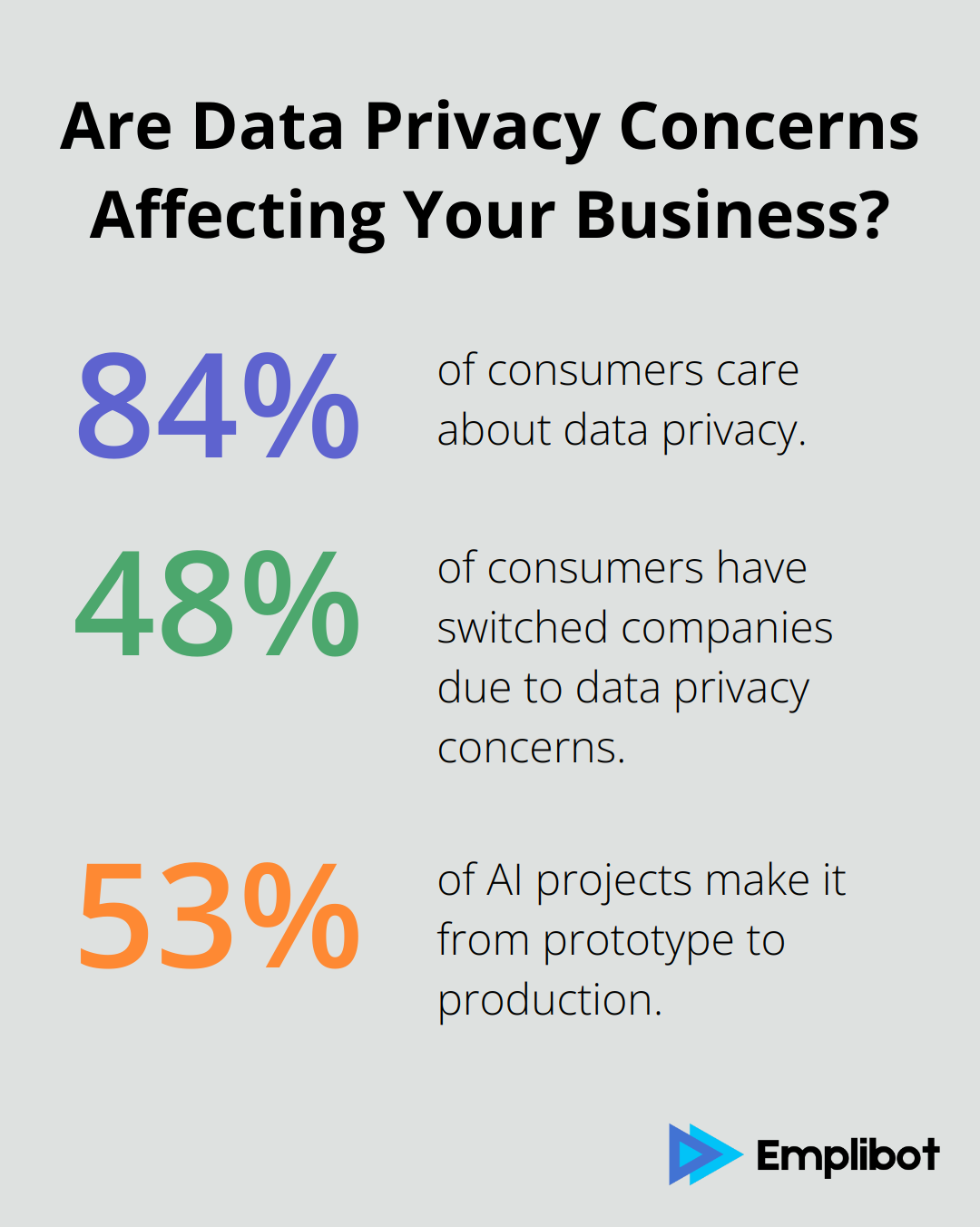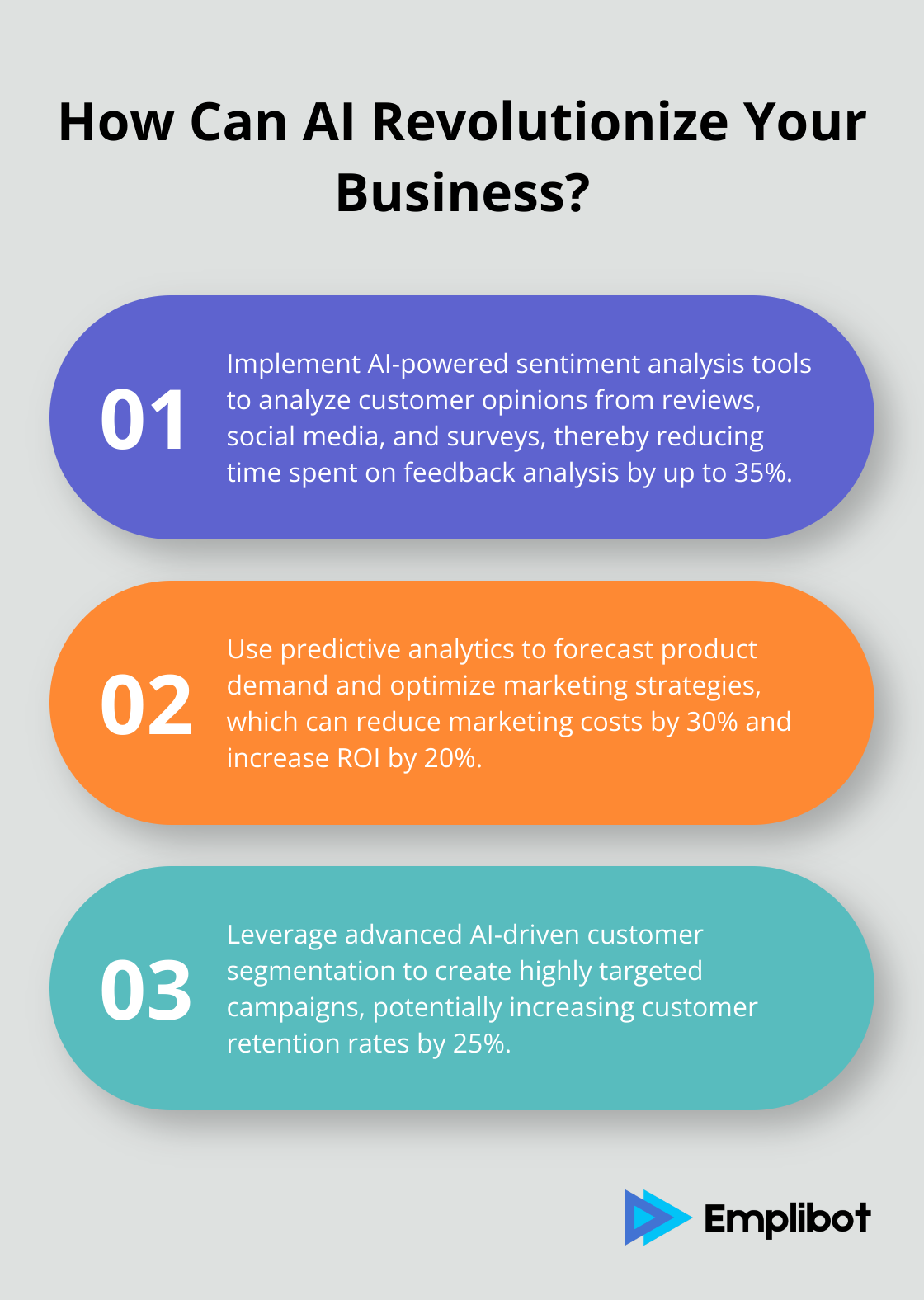Artificial intelligence is transforming market research by offering tools that enhance accuracy and efficiency.
AI-powered techniques, such as sentiment analysis and predictive analytics, provide deeper insights than traditional methods.
At Emplibot, we are seeing significant improvements in product development, marketing personalization, and competitive analysis through AI.
However, challenges related to data privacy, system integration, and cost remain critical considerations.
Contents
ToggleHow Can AI Tools Boost Market Research?
Sentiment Analysis Drives Real-Time Insights
Sentiment analysis tools powered by AI are game-changers for interpreting customer opinions. These tools analyze text data from reviews, social media, and surveys to detect emotions and opinions. This allows businesses to understand consumer sentiment in real time.

A company that integrated AI-based sentiment analysis reported a 35% reduction in time spent on customer feedback analysis. This quick turnaround helps businesses adapt faster to consumer preferences and improve product offerings. Additionally, these tools assist in identifying potential PR crises early, enabling organizations to act swiftly to mitigate negative impacts.
Predictive Analytics Transforms Decision-Making
Predictive analytics leverages AI to forecast future trends by analyzing current and historical data. This helps in identifying patterns and potential future outcomes with remarkable accuracy. Businesses using predictive analytics for market research can anticipate shifts in consumer behavior and adjust strategies accordingly.
McKinsey reports that companies employing predictive analytics can reduce marketing costs by up to 30% while increasing ROI by 20%. For instance, AI-driven predictive tools can forecast product demand, allowing companies to manage inventory more effectively and reduce waste. They can also help marketers craft personalized campaigns that resonate better with target audiences, enhancing customer engagement.
Advanced Customer Segmentation Enhances Personalization
AI facilitates advanced customer segmentation by analyzing various data points such as purchase history, demographics, and online behavior. This granular level of analysis aids marketers in creating highly targeted campaigns that speak to specific customer needs and preferences.
A case study by quantilope shows that advanced segmentation through AI resulted in a 25% increase in customer retention rates. By understanding distinct customer segments, businesses can tailor their messages and offers, leading to more effective marketing efforts and enhanced customer satisfaction. Furthermore, AI-driven segmentation can streamline resource allocation, ensuring marketing budgets are used more efficiently.
These AI-powered tools each offer practical benefits, from increased efficiency to improved customer insights. For businesses striving for a competitive edge, leveraging AI in market research is not just an option; it’s a necessity.
What Are the Practical Applications of AI in Marketing Research?
Driving Innovation in Product Development
AI is revolutionizing product development by analyzing vast amounts of customer feedback and market data to identify emerging trends and unmet needs. Companies using AI can sift through online reviews, social media conversations, and customer service interactions to pinpoint what features or improvements consumers desire most. For example, a study by Accenture found that only 12% of firms have advanced their AI maturity enough to achieve superior growth and business transformation. These “AI …]businesses leveraging AI in product development reported a [25% faster cycle from concept to market. This acceleration allows companies to stay ahead of competitors and cater to evolving market demands swiftly.

Further, AI tools like natural language processing (NLP) can classify and analyze vast datasets to uncover hidden insights. This approach enables R&D teams to focus on the most promising ideas, reducing the risk of costly failures. By integrating AI into the product development pipeline, companies can streamline their processes, innovate faster, and meet customer expectations more effectively.
Enhancing Personalized Marketing Campaigns
AI empowers marketers to create highly personalized campaigns by analyzing individual customer behaviors and preferences. This level of personalization is achieved through advanced algorithms that process data from various touchpoints, such as purchase history, browsing habits, and social media interactions. According to a report by Statista, personalized marketing campaigns powered by AI can increase conversion rates by up to 20%.
Additionally, AI helps optimize the timing and delivery of marketing messages. Tools employing predictive analytics can determine the best times to send emails or display ads, significantly boosting engagement rates. For instance, a case study from Sailthru revealed that AI-driven personalization strategies led to a 50% increase in email open rates. Such improvements in targeting and timing can have a profound impact on overall marketing effectiveness, driving better ROI for campaigns.
Streamlining Competitive Analysis
Competitive analysis becomes more efficient and insightful with AI. Traditional methods of monitoring competitors often involve manual data collection and analysis, which can be time-consuming and prone to errors. AI automates this process by continually scanning the digital landscape for relevant information about competitors, such as changes in pricing, product launches, and marketing strategies.
AI tools can synthesize this data to provide a comprehensive picture of the competitive environment. A study by PwC highlighted that companies using AI for competitive analysis can respond 30% faster to market shifts compared to those relying on traditional methods. This rapid responsiveness enables businesses to adjust their strategies promptly, seizing market opportunities and mitigating risks more effectively.
Moreover, AI-driven insights into competitive actions can inform strategic decisions, helping businesses to identify gaps in the market and innovate accordingly. By leveraging AI for competitive analysis, companies can maintain a strategic edge and adapt to industry dynamics with greater agility.
Artificial intelligence is proving indispensable in areas like product development, personalized marketing, and competitive analysis. By integrating AI into these functions, businesses can achieve remarkable improvements in efficiency, effectiveness, and overall market performance.
What Challenges Should You Consider?
Addressing Data Privacy and Ethics
When integrating AI into market research, data privacy and ethics are significant concerns. With AI’s ability to analyze vast datasets, ensuring the confidentiality and integrity of consumer information is crucial. The General Data Protection Regulation (GDPR) and the California Consumer Privacy Act (CCPA) impose strict guidelines on data handling. Businesses need to be transparent about their data collection practices and prioritize security to prevent breaches.

A study from Cisco reveals that 84% of consumers care about data privacy, and 48% have switched companies due to data privacy concerns. Therefore, companies must implement robust data protection measures and communicate their practices clearly to maintain trust. Regular audits and adherence to regulatory standards can help mitigate risks. Ensuring ethics in AI involves avoiding biases in data and algorithms, which can be achieved by diverse data sets and continuous monitoring.
Overcoming System Integration Hurdles
Integrating AI with existing systems poses technical challenges. Legacy infrastructure may not be compatible with new AI tools, requiring significant upgrades or overhauls. This integration process can be complex and time-consuming, often requiring expertise that not all enterprises possess in-house.
Gartner reports that only 53% of AI projects make it from prototype to production. Therefore, companies should develop a detailed implementation plan that includes technical assessments, stakeholder involvement, and pilot tests. Collaborating with AI vendors who offer integration support can smooth the transition. Training employees to work with new AI tools is also critical to overcoming operational disruptions and achieving seamless integration.
Evaluating Costs and ROI
Implementing AI comes with considerable costs, including licensing software, maintaining infrastructure, and hiring specialized personnel. It’s vital for businesses to conduct a comprehensive cost-benefit analysis to evaluate the ROI. For instance, despite the initial high costs, McKinsey found that companies integrating AI can cut down operational costs by up to 20%.
To maximize ROI, businesses should prioritize AI projects with clear value propositions and measurable outcomes. This may include automating repetitive tasks, enhancing data quality, or improving customer segmentation. Establishing key performance indicators (KPIs) and regularly reviewing project performance can help ensure that AI investments yield substantial returns. Additionally, exploring scalable AI solutions can allow incremental adoption without overwhelming budgets.
Understanding these challenges and proactively addressing them can help businesses fully leverage AI in market research, driving both efficiency and strategic insights.
Conclusion
AI is reshaping market research by offering tools that enhance both accuracy and efficiency. Techniques like sentiment analysis and predictive analytics provide insights that traditional methods simply cannot match. As observed at Emplibot, AI brings significant improvements in product development, marketing personalization, and competitive analysis.

However, challenges such as data privacy, system integration, and cost should not be overlooked. Addressing these issues involves maintaining transparency, implementing robust security measures, and planning careful system integration. Companies must also assess the return on investment to ensure AI projects are financially viable.
Embracing AI tools can lead to substantial benefits, from increased marketing efficiencies and better customer insights to faster product innovation. Businesses ready to leverage AI in their market research will find themselves better equipped to meet evolving consumer demands and stay ahead of the competition.
At Emplibot, we help businesses build their blogs automatically, with SEO-friendly articles, keyword research, images, and internal linking included. Learn how we can transform your content strategy at Emplibot.











